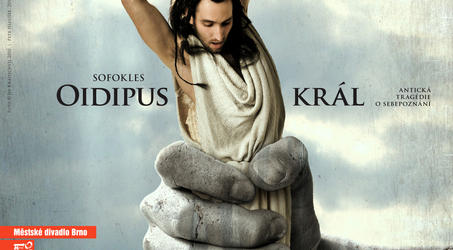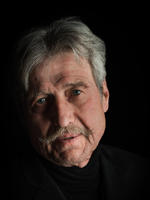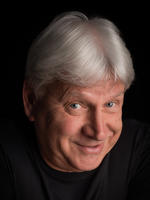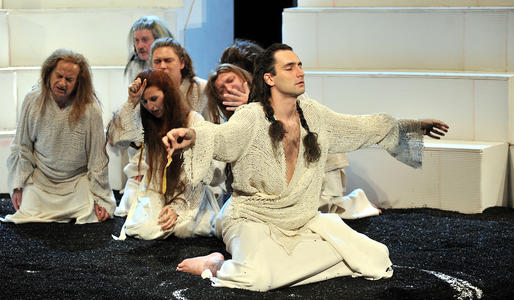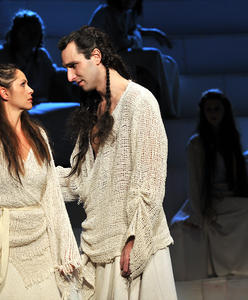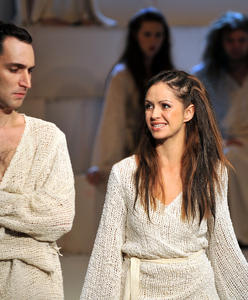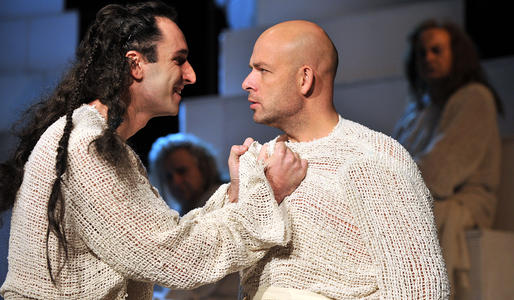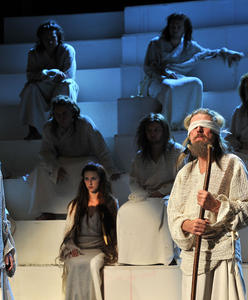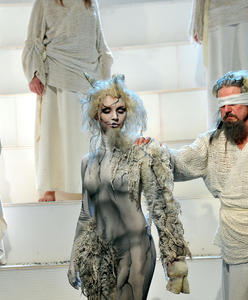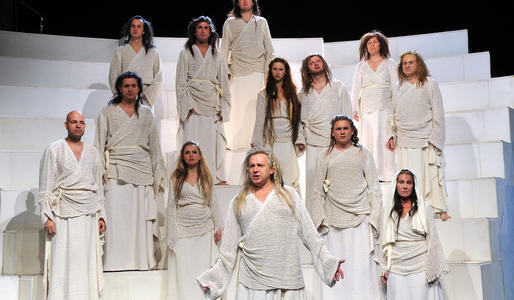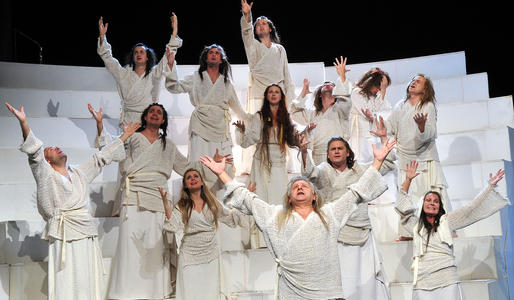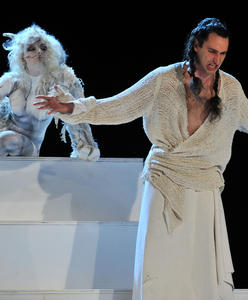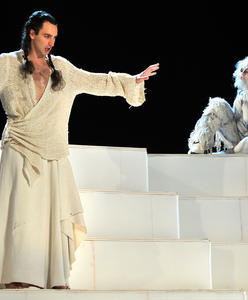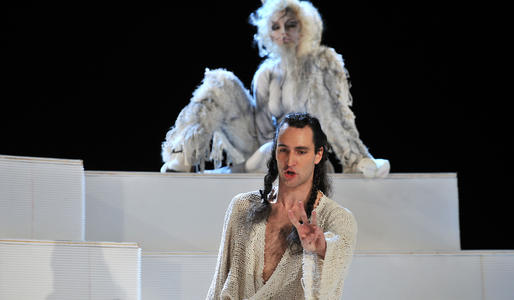Sophocles: Oedipus Rex
David Kroča 12. May 2011 zdroj Český rozhlas 3 - Vltava
The tragic story of King Oedipus, who unknowingly killed his father and married his own mother, doesn’t start on the stage at Brno City Theatre but in the auditorium, which is surrounded by a many-membered choir; thus, the spectators hear the first verses of Skácel’s smoothly flowing translation simultaneously from two sides and in close proximity. Even after the choir has moved to the stage, its many voices can still be heard: it not only comments on the deeds of the actors but also sharply interprets the opinions of the author and the people.
Stanislav Moša’s adaptation concentrates the plot of Sophocles’ drama into an eighty-minute long production which is well-arranged and easily followed by the spectators. The choral singing and speaking gives way to the voices of the main heroes, particularly Oedipus, who is trying to avert the terrible prophecy by all means. With the stubbornness of a hard-working detective, he calls more and more witnesses in order to find the offender until he realizes at the end that it is himself. The persistent search of the titular hero is accompanied by the ever-present choir for the whole time, its members being scattered around the white steps on the set designed by Jan Dušek. Their anonymity is also reinforced by the uniform white robes into which Andrea Kučerová has dressed the actors. The fact that Oedipus’s robe will be stained the colour of blood at the end can be expected. Less predictable is the added figure of the Faun, who has the role of a poetic guide. In Brno this mythological figure has an impressive half-animal form which combines girly charm with animal elements such as goat’s legs or horns.
Jiří Mach in the title role is the most convincing in moments where he can accentuate the tragic fate of this hero with physical activity; however, it still seems to be beyond his powers to fulfil the meaning of all the key verses merely via the spoken word. Jocasta, acted by Ivana Vaňková, has more dimensions particularly because the actress thoughtfully escalates the emotions and works carefully with the verse. Viktor Skála as her brother Creon is a reliable actor: he acts the role of a strong and decided man who is also able to gain profit from curbing his emotions.
Brno’s production of Sophocles’ tragedy doesn’t seek answers to questions but is rather open to many various interpretations, and works with them without pressure. The motif of the volatility of human happiness, which is depicted with unmistakable irony, is particularly impressive. While in the introduction the happy and strong Oedipus plays blind man’s buff with his children, at the end of the production he is blindfolded again and holding his children by their hands – however, this time it is a necessity as he really is a blind man now, a subject of disgrace.
The ancient tragedy Oedipus Rex on the stage of Brno City Theatre
Karla Hofmannová 18. November 2010 zdroj www.zivotnistyl.cz
The Greek playwright Sophocles isn’t really one of the most contemporary of authors, but it could be claimed that he ranks among the modern ones, particularly if his drama is produced using the rhymes of the excellent poet Jan Skácel. It speaks with easily-comprehensible language about people’s current problems, about seeking the truth and about the responsibility one has to oneself as well as to one’s nearest and dearest.
The director Stanislav Moša has prepared a simple show, without effects and pathos, without superstar glitter and catchy melodies. Despite this, or perhaps because of this, the production nails the spectators to their seat and forces them to follow the stream of verses almost without the chance to draw breath. It brings a choir onto the stage in simple white clothes, which the actors also wear. The character of the female Faun, half-woman half-goat, takes one through the performance and introduces an element of sensuous charm, accompanied by the sound of a flute. The choir memorizes, comments, explains, questions, and also Oedipus (Jiří Mach) continues with its intonation. When this style starts to bore, Jocasta (Ivana Vaňková) enters the stage bringing life, emotion and energy.
The blind oracle Theirésiás (Josef Jurásek) brings wisdom and tragedy onto the stage. It is thanks to him that sentences which have been valid since the olden days up to modern times can be heard, and they confront the bearers of power with their conscience and force them to be responsible for their words and deeds. It’s a message to all who should realize that to have power particularly means to have the courage to take the responsibility onto oneself. The character of Creon (Viktor Skála) speaks for all those who have been blamed unjustly and sets an example of how to deal with this situation with honour. On top of this, all of the words are spoken in beautiful Czech - their author is the Brno poet Jan Skácel.
This ancient tragedy accentuates fate and the will of gods. However, the individual still bears the responsibility even though he or she is only a toy in their hands, and the more they try to defy their fate, the more they get entangled in it. Oedipus’ greatness lies in the fact that he doesn’t complain and accepts responsibility even under these conditions. The premiere took place on 30th and 31st October at the Drama Theatre of Brno City Theatre.
Oedipus Rex and our self-knowledge
Peter Stoličný 3. November 2010 zdroj divadlo.sk
It would be “bringing owls to Athens” to describe what Sophocles’ tragedy Oedipus Rex is about to theatre lovers. So the basic question isn’t “what” but “how”. In Brno this classic work was last produced in 1972, with a beautiful translation by the poet Jan Skácel. He wasn’t allowed to publish after “the arrival of friendly armies” in 1968 - the regime didn’t like poets who spoke their mind - and thus the director of the Mrštík Brothers’ Theatre (now Brno City Theatre) and also of Oedipus, Milan Pásek, officially took responsibility for the authorship. According to people who remember those times, the schizophrenia of the period lay in the fact that the actors knew who the translator was. Poet Jan Skácel was a non-overlookable Brno personality, despite the efforts of the regime to silence him.
Thus, the current production of Oedipus Rex is openly and publicly “Skácelish” under the sensitive direction and adaptation by Stanislav Moša, the director of Brno City Theatre. I admit that I went to watch the premiere with slight doubts. I’m allergic to innovation as far as international classics are concerned, and Moša is an innovator. He knows how to play with light effects, how to put the mise-en-scene into motion, he knows how to play with music as well as expressiveness in acting. So what was he going to surprise us with in Oedipus?
I asked myself and simultaneously wished that he wouldn’t want to surprise anyone much… Characters with variously draped white costumes (Andrea Kučerová) performed on a plain white stage with a huge white staircase and so the whole effect was distinctively minimalist. The author of this well-made set is Jan Dušek. Sophocles’ verses were declaimed as civilly as can be imagined, although with an air of historic pathos. After all, it was the fifth century speaking to us.
The director released a choir onto the stage, which, exactly according to the ancient tradition, engaged in dialogue both with the Gods and the acting characters. Apart from the choir, there weren’t usually more than two or three actors on the stage (the drama writer Sophocles didn’t need more than two actors and this active choir for a dialogue). The only theatrical element that could be called current was the character of the Faun, with a beautiful costume and dancing, who presented the atmosphere of the key situations on the stage. The character seemed as if it had been cut out from the ancient bacchanalia and satyr plays which we know mainly from the decorated bowls and amphorae of Ancient Greece.
Director Moša really approached this beautiful classical work with respect and humility and thus gave the spectators space to think about this eternal topic and the chance to look for parallels with the life and opinions of a contemporary person in society. This Oedipus story always has two levels and therefore there was double the amount to think about… First, there is the question of guilt for committed crimes and the courage to accept punishment for this guilt. To make things simple it can be said that the play deals with the principle of citizens’ coexistence - an individual, his responsibility and the society which respects and invokes this responsibility. The other level is that of the spectators, who are fascinated by horror. They experience it from the standard feeling of “horror vacui”, when an unsolvable situation evokes hopeless emptiness in us, up to a feeling of action: this horror didn’t happen to us but to someone else.
Here, I have to stop for a moment and remember the philosopher and university teacher Jan Patočka, who also wasn’t very popular with the ex-Czechoslovak communist powers in the 1970s and therefore couldn’t lecture at Charles University. We used to go to his house as students. There, he explained his attitudes to ancient times which he was, at that time, describing in his work entitled Aristoteles, predchodcovia a dedičia (Aristotle, his ancestors and heirs). He was one of the first, as far as I know, who thought about the social question of Oedipus’ guilt. When I look at my old notes, I can choose the following sentences about criminal offences: Dolus directus is the intentional committing of crime. This isn’t Oedipus’s case. It also isn’t dolus eventualis because the crime wasn’t committed due to carelessness. Therefore, Oedipus is exculpated. So what does his guilt involve? Even if we consider him to be completely innocent, is the burden of guilt on the gods? What is human in these “games of the gods”? Are we really only toys in the hands of the powerful and can’t we do anything at all with their vagaries? When we shoulder the burden of guilt can we do nothing else but blind ourselves? Should we punish ourselves, even though we are innocent? Take the burden for the others? At Patočka’s private seminars, surrounded by Novotný’s regime and stupefied by compulsory Marxism and Leninism, we found so many questions from the present in the ancient Oedipus that we couldn’t sleep peacefully at night. I’m coming back to it today because I realize the superficiality in which we live in our period of mass consumerism and how we have forgotten to ask questions because of being surrounded by too much of everything.
How do we perceive Oedipus Rex today? I fear that we only see the other aspect of the tragedy - the eternally spectator-focused one. It affects us with its horror and we aren’t curious about how it will end. The ancient Greeks knew it as well as we know it now. But we are curious about how it will be made. Director Moša has produced Oedipus in such a way that we can really experience the mythical horror of the events which had to happen. They taught us in psychology lessons that when seeing torture, cruel films, murders, executions, the watchers are always fascinated while telling themselves in their subconscious: ‘this didn’t happen to me but to someone else’. This feeling creates a positive rush of adrenalin in the body chemistry. Therefore, mysteriously dark Gothic literature was read and today we are fascinated by horror films; it’s why young people enjoy playing computer games in which heads are chopped off with a chain saw and why we are fascinated by mass car accidents and plane crashes. We think: ‘It didn’t happen to us, thank God,’ and the chemistry of our body makes us experience a non-definable, pleasant feeling. Director Moša certainly knows all this, and he builds his work on these pure and easy-to-read presuppositions. He has made this production minimalist in expression and crystal clear in narration so that there is space for us, the spectators, to think about the eternal questions of guilt, punishment and social responsibility.
All the actors in the production played in exactly determined and balanced roles. Jiří Mach’s Oedipus was properly monumental as well as monumentally unhappy. Viktor Skála’s Creon is steady and self-confident, the oracle and old man exactly as the ancient drama intended. There was something not quite right about the beautiful and fragile Ivana Vaňková as Oedipus’s wife and mother, due to her physical appearance. The spectators accepted the wife; however, it was somewhat more difficult with the mother. It would be easier to make me believe in the story that Oedipus’ wife was also his own daughter. But this would be a completely different tragedy. The choir was very impressive and in places even fascinating in their musicality. It really added a social dimension to the atmosphere of tragedy as well as the fatality of the tragedy (music by Zdenek Merta and Karel Škarka, music production by Karel Škarka). The four children on the stage were also a poignant element. They moved confidently, naturally and cutely. This wasn’t the first time that the director has shown that he knows how to work with children and that a child on the stage is a very good and efficient element which evokes emotions. And a spectator who is filled with emotion is a good spectator…
Stanislav Moša as a director has again shown that he is a magician of the theatre who knows how to read a text wisely and interpret it meaningfully. To be absolutely clear at the end, I have to say that I have never seen such a well-produced Oedipus in my life before - and I have already seen rather many.
Jan Skácel’s Oedipus at Brno City Theatre for the third time
Jiří P. Kříž 2. November 2010 zdroj Právo
There isn’t a person who wouldn’t feel sorry for the Theban ruler who was ruined by fate after the gods chose a path for him as the greatest destroyer of relationships and happiness for himself, his family and offspring. Sophocles placed all of this in the tragedy Oedipus Rex five centuries before Christ.
Only one translation has remained the best, and that’s Jan Skácel’s. It first appeared on stage in 1973, and secretly, as the poet was banned. The greatest Czech poet of the second half of the twentieth century didn’t live to experience the second production in 1991 (he died on 7.11.1989). The third production was created at the end of October 2010 by Stanislav Moša at Brno City Theatre.
Promises – all talkMoša is no provocateur; his production of Oedipus is rather one of urgency. The blame which the unhappy king takes upon himself isn’t at all for cruelties he has committed himself. Is his father less evil, he who ordered his son killed in fear of the fulfilment of a prophecy? And is it an offence to defend oneself against the unsuspected ill-nature of one’s ruler, slaughter one’s outnumbering opponents and unknowingly become a patricide?! Is it so bad to live and have children with a widow not knowing that she is one’s mother? Oedipus cannot be acted as a museum piece, as a story of the fulfilment of the machinations of all-powerful deities. Fortunately, people have already, and rightly, taken their omnipotence from them.
Doesn’t the cursed one, who promises to free Thebes from plague and punish the killers of the king without knowing that he is giving judgement on himself, stand tall above everyone? He doesn’t spare himself the punishment; indeed, he makes it even harsher. Oh you Czech politicians, where have your election promises gone yet again? Fortunately, people have already, and rightly, taken the trustworthiness from you a long time ago.
Great affectionThe stage by Jan Dušek is formed by the steps of an amphitheatre or forum. The costumes by Andrea Kučerová are suitably white and ecru. The music by Zdenek Merta and Karel Škarka is as noble as great affection, and Skácel’s verse is perfectly ancient as well as contemporary. Jiří Mach’s Oedipus is an acting discovery. He radiates imbalance and expression. Ivana Vaňková’s Jocasta – so beautiful that no-one is surprised by Oedipus’ actions. Viktor Skála’s Creon only seemingly doesn’t long for power. He gets it, and with this the curse of Oedipus’ kind has only just begun.

